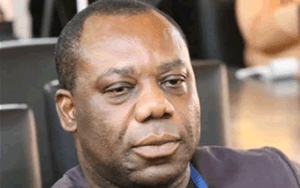Energy Transition is good for Africa, but should be gradual – Minister

Dr Matthew Opoku Prempeh, the Minister for Energy says the desire for countries to transition into other alternative sources of energy usage was particularly good for Africa and its women and children.
He said, “I remember when I visited a school in the Northern Region sometime back and could enter the kitchen because of the thick smoke emanating from the use of firewood…same way in our villages and homes women continue to use firewood and charcoal for domestic purpose with its high health burden.”
Dr Opoku Prempeh said these factors coupled with other pertinent industry needs made it prudent for the country to explore and produce more hydrocarbons and associated gases for use by many African homes and industries adding, “we are creating a just energy transition for Africa…which is paramount in the long term”.
The Energy Minister was speaking at the 2022 local content conference and exhibition in Takoradi in the Western Region on theme, “Sustaining Local Content Development Through Enhanced Exploration and Production Activities in The Era of Energy Transition.”
The annual event hosted by the Petroleum Commission (PC) and partners, would engender conversations on country preparedness for the transition, building a regional oil and gas business, strategize way forward, role of the academia in sustaining local content development and managing assets in offshore environment and the role of indigenous Ghanaian companies.
Dr Opoku Prempeh noted that the country was blessed with lots of minerals to add in the quest for green technology and noted the urgent steps to add value to these minerals rather than exporting it to other countries in their raw state.
The Energy Minister indicated that Ghana’s Energy Transition Framework which was out doored in Egypt would cost 561 billion dollars but, in the meantime, the country was prepared to advance the use of gas adding, “Gas is the new breed.”
Ghana, he pointed out that needed time and the training for effective transitioning processes bearing in mind the strong development of locals expertise.
The Energy Minister explained that the President Nana Addo Dankwa Akufo-Addo had also assured the global community of Ghana’s full commitment to enhancing the proportion of renewable energy in the national energy generation mix at the just ended COP 27 at Sharm el-Sheikh in Egypt.
Dr Opoku Prempeh added that the country would continue to increase the share of renewable energy in its electricity generation mix, as well as explore the options of hydrogen gas and other clean energy sources to meet its energy needs adding that “Ghana’s National Energy Transition Framework, which had been put together following extensive nationwide consultations will guide our transition to a net zero economy by 2070.”
The Chief Executive Officer of the Petroleum Commission, Mr Egbert Faibille Jnr, said the conference would deepen advocacy for local content development to enhance exploration and production activities in the era of an energy transition that sought to reduce production and consumption of hydrocarbons and other high carbon energy resources.
He pointed out that, local content development in the upstream oil and gas industry thrived best with increased exploration and production activities where enormous opportunities are created for both local supply chain and employment.
The CEO of the Petroleum Commission said since the discovery of hydrocarbons in commercial quantities in 2007, the country had made significant strides in taking advantage of local content development opportunities presented by its growing industry.
“Whilst on this lane of exploration and production of hydrocarbons, Ghana like other resource rich developing economies has been confronted with the energy transition. There is today an almost global and growing trend of a gradual transition from fossil fuels to renewable energy or a movement from black to green in the global energy mix.
The PC CEO mentioned that, one of the key effects of the transition had been the systematic shift in investments from fossil fuel development projects to renewable energy.
He said, Ghana’s commitment and positions on the energy transition envisaged a harmonious co-existence of exploration and production activities and renewable energy, stressing “the future still looks promising for local content development in Ghana.”
The Western Regional Minister, Mr Kwabena Okyere Darko-Mensah, said the choice of the Region provided the opportunity for participants to engage the oil and gas sector as well as make the Region feel an integral part of the oil and gas business.
He prayed that actors in the sector formulated policies that spur local involvement for development…”I believe you need to create local champions and showcase them as your achievement in the Local development drive”.
Mr Darko-Mensah added that the conference should also ensure strategies were outlined to ensure transparency, openness and the maximization of the oil and gas potentials for communities.
Source: GNA
